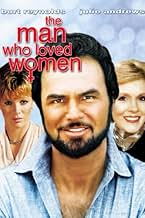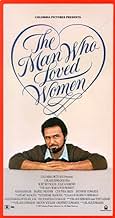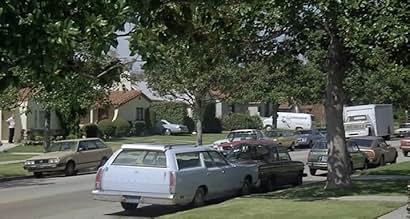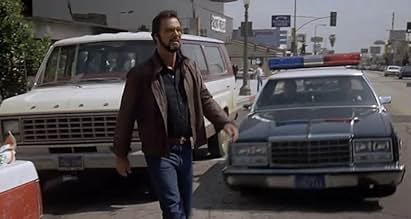IMDb RATING
5.3/10
2.6K
YOUR RATING
A womanizing sculptor named David goes to seek help from a psychiatrist, Marianna, to cure him of his obsession with women.A womanizing sculptor named David goes to seek help from a psychiatrist, Marianna, to cure him of his obsession with women.A womanizing sculptor named David goes to seek help from a psychiatrist, Marianna, to cure him of his obsession with women.
Herb Tanney
- Doctor
- (as Schweitzer Tanney)
Storyline
Did you know
- TriviaFirst of two movies that Kim Basinger made with writer, producer, and director Blake Edwards. The second being Blind Date (1987).
- GoofsReflected on the back window of David's car, after he crashes it into a tree.
- Quotes
Agnes Chapman: You're a fast worker. I better leave before one of us gets pregnant.
David Fowler: I'm not that fast.
- SoundtracksLittle Boys (theme song)
Music by Henry Mancini
Lyrics by Alan Bergman & Marilyn Bergman
[Played over the closing credits]
Performed by Helen Reddy
Featured review
Blake Edwards in the Sixties was an amazing director, with a strong visual flair. I mean he directed "Breakfast at Tiffany's", "Days of Wine and Roses", and "An Experiment in Terror"! But somewhere in all that Pink Panthering he did in the Seventies he lost that visual flair and became boring. The only film in the last thirty years that showed any of the old panache was "Victor/Victoria". It's like there are two Blake Edwards.
That's not to say that this film is terrible - it's just that I think he could have done so much better. It's so dull to look at - despite the presence of his enchanting wife Julie Andrews, and one of Burt Reynolds' best performances. Also of note is a very young Kim Basinger displaying a strong flair for comedy. But Edwards' pacing of the action is so slow and ponderous that the moments of slapstick comedy seem completely incongruous and fall completely flat.
Come on Blake - give us some more of that old magic! I know it's still in you.
That's not to say that this film is terrible - it's just that I think he could have done so much better. It's so dull to look at - despite the presence of his enchanting wife Julie Andrews, and one of Burt Reynolds' best performances. Also of note is a very young Kim Basinger displaying a strong flair for comedy. But Edwards' pacing of the action is so slow and ponderous that the moments of slapstick comedy seem completely incongruous and fall completely flat.
Come on Blake - give us some more of that old magic! I know it's still in you.
- How long is The Man Who Loved Women?Powered by Alexa
Details
- Release date
- Country of origin
- Official site
- Languages
- Also known as
- Frauen waren sein Hobby
- Filming locations
- Houston, Texas, USA(Texas scenes.)
- Production companies
- See more company credits at IMDbPro
Box office
- Budget
- $12,000,000 (estimated)
- Gross US & Canada
- $10,964,740
- Opening weekend US & Canada
- $1,347,032
- Dec 18, 1983
- Gross worldwide
- $10,964,740
- Runtime1 hour 50 minutes
- Sound mix
- Aspect ratio
- 1.85 : 1
Contribute to this page
Suggest an edit or add missing content

Top Gap
By what name was The Man Who Loved Women (1983) officially released in India in English?
Answer
































